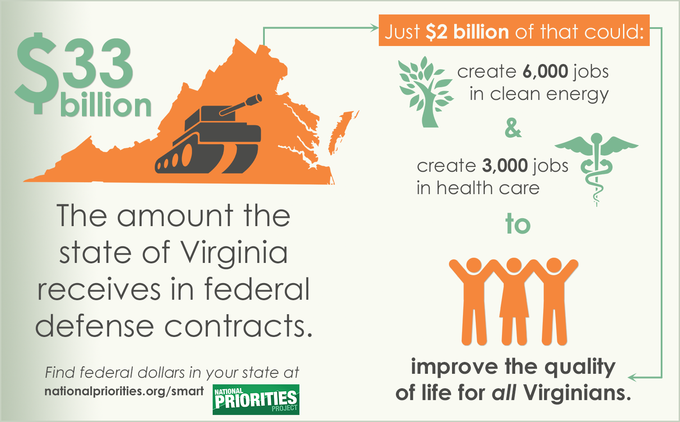Would Cutting Military Spending Hurt Virginia’s Economy?
By
Guest Blogger
Posted:
|
Military & Security
by Elizabeth Casey-Rutland

As a native Virginian I care about my state and its people. I was born in Virginia and have lived there for most of my life. The issues that affect Virginia affect me, my family, and my friends. One of the most important issues for many Virginians is the military and military spending.
Federal spending on defense affects people throughout the country, but in few places are those effects more tangible than in Virginia. With over 140,000 Virginians directly employed by the military, Virginia has the highest concentration of military employees in the country. This figure does not include the people employed with the over $33 billion in defense contracts that went to Virginia firms in 2013. In total, Virginia received over $45 billion in military spending in 2013.
For the many Virginians who, directly or indirectly, draw their livelihood from military spending, the idea of cutting that spending is worrying. If lawmakers cut military spending, would thousands of Virginians suddenly be out of work?
It turns out that Virginians would have little reason to fear that less military spending would mean fewer jobs. If money were diverted from the military to other important projects, Virginia could actually end up with a lower unemployment rate. For example:
- If the federal government shifted just $1 billion away from the military and invested it in clean energy instead, Virginia could gain about 6,000 jobs, while becoming more environmentally responsible.
- Virginia could alternatively use that $1 billion to invest in its crumbling infrastructure. Poor road conditions currently cost Virginians $1.8 billion a year in vehicle repairs. Improving these roads would put money back into the pockets of Virginia consumers.
- Money currently being spent on the military could also be diverted to improving Virginia’s public education system. Every dollar spent on education produces 2.5 times the number of jobs as a dollar spent on the military.
- That money could also be used to increase access to health care. Virginia’s ageing population will soon need increased health care resources. Moving just $1 billion from the military to health care in Virginia, would help meet the medical needs of Virginians, and create about 3,000 new jobs.
These numbers indicate that a redistribution of resources away from the military and towards other worthy sectors would not hurt Virginia’s economy or people, but would in fact result in more jobs and improved quality of life. There is even a department of defense program that helps local businesses and workers make the transition when military programs are downsized or eliminated. Virginians can critically evaluate the costs and benefits of exorbitant military spending without worrying that a cut for the military will mean a cut for them.